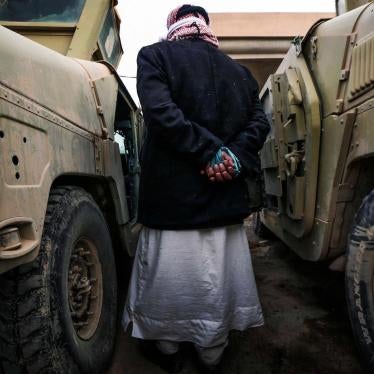Iraqi deserters detained by Kurdish or U.S. forces in northern Iraq must be accorded full prisoner of war status under the 1949 Geneva Conventions, Human Rights Watch urged today.
Human Rights Watch estimates that as of April 2, up to 130 Iraqi soldiers had surrendered to the Kurdistan Democratic Party (KDP). The deserters were fleeing U.S. bombardment and ill treatment by their own commanders.
"Iraqi soldiers who desert their units and flee into Kurdish-controlled areas should be treated as prisoners of war," said Hania Mufti, London Director for the Middle East and North Africa Division. "They are entitled to the same rights and benefits as Iraqi soldiers taken prisoner by U.S. forces."
Iraqi soldiers who attempt to desert to Kurdish-controlled areas have faced Iraqi army execution squads, a violation of international human rights law.
Both Kurdish officials and the U.S. presidential envoy to the Iraqi opposition (the latter in a public statement issued on March 31) have announced an agreement for Kurdish forces to put themselves "under the command and control of U.S. forces." In doing so, Kurdish forces became effectively part of the armed forces of one of the parties to the international armed conflict in Iraq.
Among other obligations derived from this status, Kurdish forces must comply with an internal disciplinary system and observe respect for the rules of international humanitarian law applicable to international armed conflicts. Under international law, ultimate responsibility for the well-being of these prisoners of war (POWs) lies with the detaining power - that is, the central U.S. authorities under whose command the Kurdish forces taking the prisoners have placed themselves.
Iraqi soldiers who fall into the power of their enemy are entitled to the status of prisoners of war and therefore to the benefits and guarantees of the Third Geneva Convention. It is the responsibility of the detaining authorities to ensure these protections. In the case of the Iraqi POWs, many have expressed intense fear of reprisals against their families still in Iraq if their identities are revealed. This makes the duty to protect them from "public curiosity" even more critical.
The guarantees all POWs are entitled to include:
- humane treatment at all times;
- protection from exposure to danger while awaiting evacuation from a fighting zone;
- not being sent to or detained in a location where they may be exposed to fire from the combat zone;
- protection from reprisals or collective punishment;
- protection of their honor; they must not be subject to insults or violence or be made a public curiosity;
- internment in premises affording basic hygiene and provision of acceptable food, clothing, and shelter. If they are wounded or sick they should be provided with the same medical care that is given to the members of the armed forces of the detaining power;
- release at the end of hostilities;
- immunity from prosecution solely for having taken part in the armed conflict.
Furthermore, if questioned, POWs are obliged only to give their name and rank, date of birth, and military serial number or equivalent information; they may not be punished for failing to provide other than this narrowly prescribed information.








